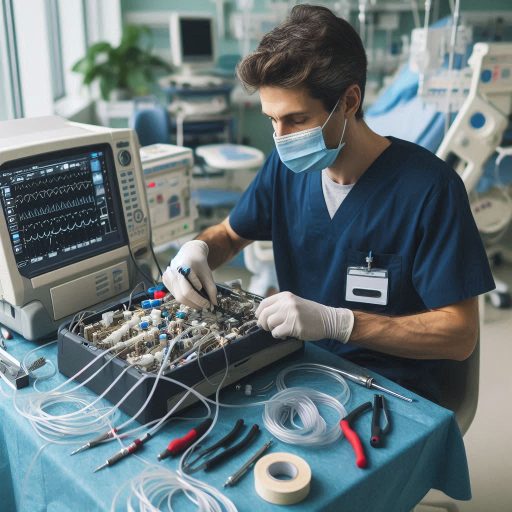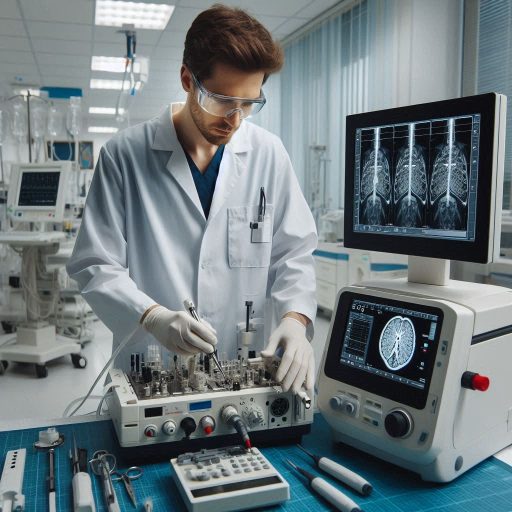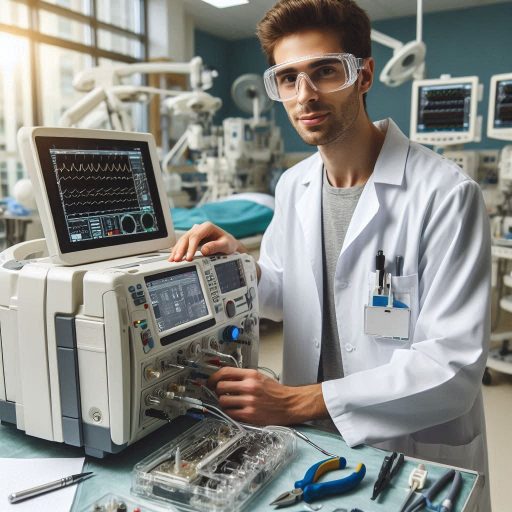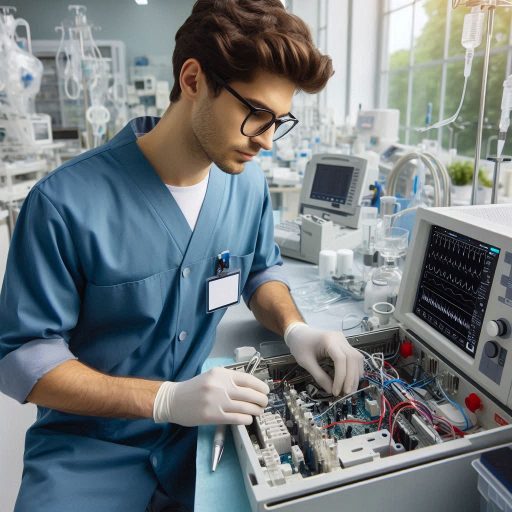Introduction
To get hired as a Biomedical Equipment Technician, start by securing relevant education and certifications.
Typically, a degree in biomedical engineering, electronics, or a related field is essential.
Certifications from recognized organizations, like the Certified Biomedical Equipment Technician (CBET) credential, can enhance your qualifications and credibility.
Gain hands-on experience through internships, apprenticeships, or entry-level positions.
Practical experience is invaluable for developing the skills needed to troubleshoot and repair medical equipment effectively.
Work on real-world projects to build your resume and demonstrate your capabilities.
Update your resume to highlight your educational background, relevant certifications, and practical experience.
Tailor your resume to each job application, emphasizing skills and achievements that align with the job description.
Networking plays a vital role in your job search.
Connect with industry professionals through networking events, conferences, and online platforms like LinkedIn.
Building relationships in the field can provide valuable job leads and insights.
Prepare thoroughly for interviews by researching the company and practicing common interview questions.
Showcase your problem-solving skills and technical knowledge.
Stay current with industry trends and emerging technologies to demonstrate your commitment to continuous learning.
Finally, apply to multiple job openings to increase your chances of securing an interview.
Understanding the Role of a Biomedical Equipment Technician
Responsibilities and Duties of a Biomedical Equipment Technician
Biomedical Equipment Technicians (BMETs) have a range of responsibilities crucial for maintaining medical device functionality.
They inspect and test equipment to ensure it operates correctly.
Routine maintenance tasks involve cleaning, calibrating, and updating devices.
BMETs also troubleshoot issues, diagnose malfunctions, and perform necessary repairs.
A key duty is documenting all maintenance and repair activities in detail.
This record-keeping helps track equipment performance and compliance with safety standards.
BMETs collaborate with medical staff to train them on the proper use of equipment.
They ensure that all devices meet regulatory and safety requirements, often liaising with manufacturers for technical support and parts.
BMETs also install new equipment and integrate it into existing systems.
They manage inventory, ordering parts and tools as needed.
Staying informed about the latest technologies and industry trends is crucial for effective performance.
Skills and Qualifications Required for the Job
To be hired as a BMET, specific skills and qualifications are essential.
A strong foundation in electronics and mechanical systems is crucial.
BMETs must have technical expertise to troubleshoot and repair complex equipment.
Familiarity with medical device software and hardware is also important.
Attention to detail is vital for accurate diagnostics and repairs.
BMETs should possess excellent problem-solving skills to address equipment issues efficiently.
Good communication skills are necessary for interacting with medical staff and explaining technical information clearly.
A formal education in biomedical engineering or a related field is often required.
Many positions also require certification, such as from the International Certification Commission for Clinical Engineering and Biomedical Technology (ICC).
Hands-on experience through internships or previous job roles provides practical knowledge and enhances employability.
Additionally, BMETs should be familiar with regulatory standards and safety protocols.
Understanding how to comply with industry regulations ensures that all equipment meets required standards.
Proficiency with various diagnostic and repair tools is essential for effective performance.
BMETs are responsible for the maintenance, repair, and calibration of medical equipment.
Their role includes documenting activities, training staff, and ensuring compliance with safety standards.
Key skills for the job include technical expertise, problem-solving, attention to detail, and good communication.
A relevant educational background and certification are typically required, along with hands-on experience.
These qualifications and skills collectively ensure that BMETs perform their duties effectively and contribute to a safe and functional healthcare environment.
Read: Online Courses for Surveying and Mapping Technicians
Obtain the necessary education and training
Research Educational Programs and Certifications
Researching educational programs and certifications is the first step toward becoming a Biomedical Equipment Technician.
Start by exploring accredited programs that offer degrees or diplomas in biomedical technology or a related field.
Look for institutions with a strong reputation in medical equipment training.
Many programs include coursework in electronics, medical equipment, and biomedical engineering principles.
Ensure that the program you choose is recognized by relevant professional organizations.
Certifications enhance your qualifications and increase employability.
Key certifications include the Certified Biomedical Equipment Technician (CBET) and Certified Radiology Equipment Specialist (CRES) credentials.
These certifications demonstrate your competence and adherence to industry standards.
Check the prerequisites for each certification, such as required experience or education.
Preparing for and passing these exams can significantly boost your career prospects.
Consider Enrolling in a Formal Training Program
Enrolling in a formal training program provides a structured path to becoming a Biomedical Equipment Technician.
These programs offer comprehensive education in both the theoretical and practical aspects of the field.
Look for programs that include hands-on training with medical equipment.
Practical experience is crucial for developing the skills needed for troubleshooting and repair.
Formal training programs often collaborate with industry partners, offering internships or job placement assistance.
This experience can be invaluable in securing your first position as a technician.
Evaluate the program‘s curriculum to ensure it covers relevant topics, such as safety regulations, equipment maintenance, and repair techniques.
Explore Apprenticeship Opportunities
Apprenticeships offer an alternative route to becoming a Biomedical Equipment Technician.
They combine on-the-job training with classroom instruction, allowing you to earn while you learn.
Apprenticeships often involve working under the guidance of experienced technicians, providing real-world experience.
This hands-on approach helps you develop practical skills and industry knowledge.
Research local healthcare facilities, medical equipment manufacturers, or trade organizations for apprenticeship opportunities.
Many employers value apprenticeships because they produce highly skilled and experienced technicians.
Completing an apprenticeship can lead to full-time employment and advance your career in biomedical technology.
Read: CAD Technician Salary: What to Expect in the USA
Gain hands-on experience
Seek Out Internships or Volunteer Opportunities in Healthcare Settings
To become a Biomedical Equipment Technician (BMET), gaining practical experience is essential.
Internships and volunteer opportunities in healthcare settings offer invaluable hands-on training.
Start by contacting local hospitals, clinics, or medical equipment companies to inquire about available positions.
Many healthcare facilities offer internships that provide exposure to various medical devices and systems.
These opportunities allow you to apply theoretical knowledge in real-world scenarios.
Volunteering in healthcare settings also helps build your resume and demonstrates your commitment to the field.
By assisting with equipment maintenance or repairs, you gain experience and develop relevant skills.
You will also learn about the daily operations of medical facilities, which is crucial for understanding equipment needs.
Networking with healthcare professionals during these experiences can lead to valuable connections and job referrals.
Learn from Experienced Technicians and Professionals in the Field
Learning from experienced BMETs and other professionals is vital for career growth.
Seek mentorship from seasoned technicians who can provide insights into the profession.
Experienced BMETs can offer guidance on best practices, troubleshooting techniques, and industry standards.
Their practical advice can help you avoid common mistakes and improve your skills.
Attend industry workshops, seminars, and conferences to expand your knowledge.
These events often feature experienced professionals who share their expertise and experiences.
Engaging in professional organizations related to biomedical technology can also provide access to a network of skilled technicians.
Participate in discussions and ask questions to learn from their experiences.
Consider joining online forums or social media groups dedicated to BMETs.
These platforms allow you to connect with professionals from various locations.
Sharing knowledge and experiences with peers in these communities can enhance your understanding of the field.
Additionally, many educational programs include practical training with experienced instructors.
Take advantage of these opportunities to gain hands-on experience and learn from those who have been in the field for years.
Their guidance can provide you with a solid foundation and help you stay current with technological advancements.
Read: Top CAD Software for Aspiring CAD Technicians
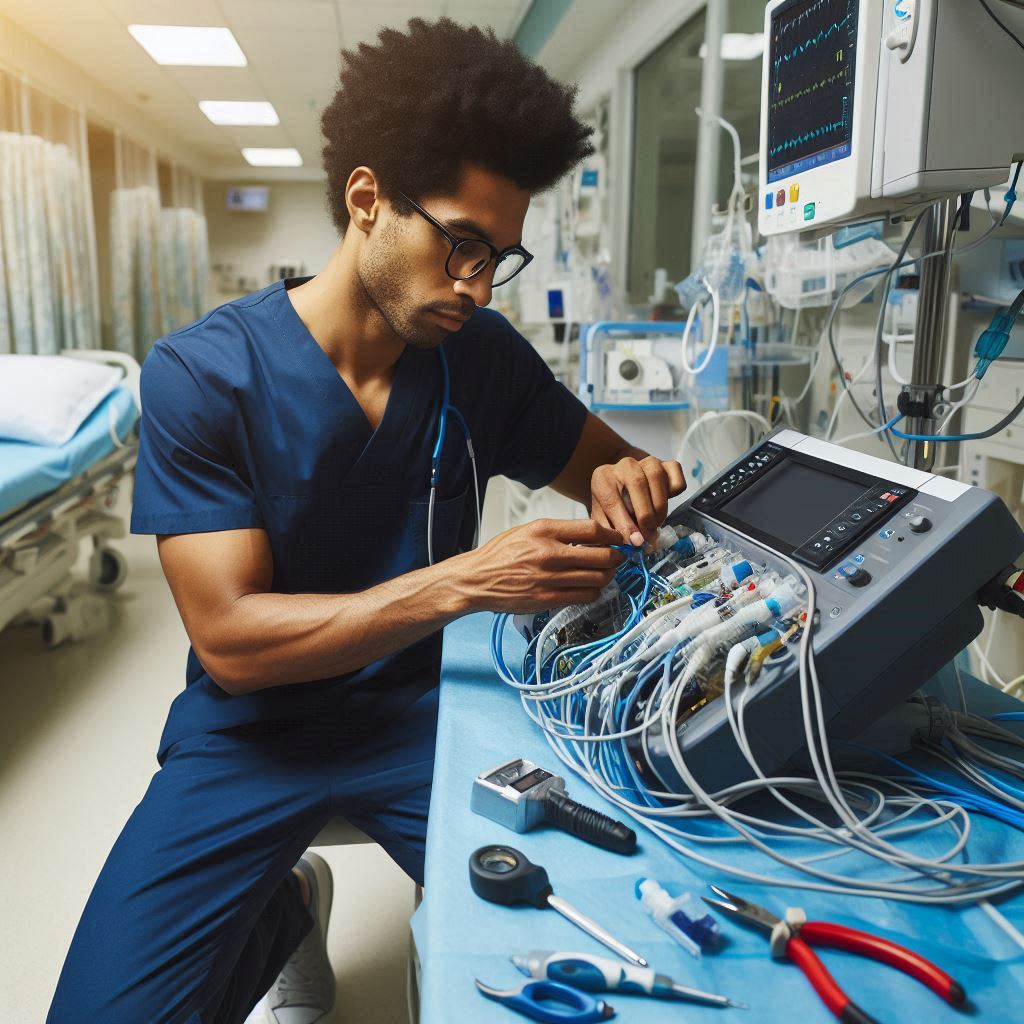
Develop technical skills
Familiarize Yourself with Different Types of Medical Equipment
To get hired as a Biomedical Equipment Technician (BMET), you must know various medical devices.
Start by researching common equipment used in healthcare settings.
This includes imaging devices, like MRI machines, and monitoring equipment, such as ECG machines.
Understanding these devices‘ functions and operations is crucial for your role.
Many BMETs gain experience through internships or hands-on training programs.
These opportunities allow you to work directly with different types of equipment.
Familiarize yourself with the specific devices used in the facilities where you apply.
This targeted knowledge can make you a more attractive candidate.
Reading technical manuals and industry guides can also enhance your understanding.
Many manufacturers provide detailed documentation on their equipment.
Study these resources to learn about device specifications, maintenance procedures, and safety protocols.
Additionally, consider obtaining certification related to the equipment you‘re interested in.
Specialized certifications can demonstrate your expertise and commitment to potential employers.
For instance, certifications in radiology or laboratory equipment can be beneficial if you focus on those areas.
Practice Troubleshooting and Repairing Equipment
Practical skills in troubleshooting and repairing equipment are essential for BMETs.
Gain hands-on experience by working on real or simulated medical devices.
This experience helps you develop problem-solving skills and technical expertise.
Set up a practice area with various equipment types if possible.
Simulate common issues and practice diagnosing and repairing them.
This practice improves your troubleshooting abilities and prepares you for real-world scenarios.
Many technical schools and training programs offer labs where you can practice these skills.
Take advantage of these opportunities to refine your abilities.
You‘ll learn how to use diagnostic tools, such as oscilloscopes and multimeters, and interpret error codes effectively.
You can also benefit from online resources and forums where professionals share troubleshooting tips and repair techniques.
Engaging with these communities can provide practical insights and solutions to common problems.
Seek feedback from experienced technicians during your training.
They can offer valuable advice on handling specific issues and improving your techniques.
Building a network of industry professionals can also help you stay informed about best practices and emerging technologies.
Read: How to Become a CAD Technician: Step-by-Step Guide
Attending Conferences, Workshops, and Industry Events
To enhance your chances of getting hired as a Biomedical Equipment Technician, actively participate in conferences, workshops, and industry events.
These gatherings offer invaluable opportunities for networking and learning.
Start by identifying key events related to biomedical equipment and healthcare technology.
Major conferences such as the Annual Biomedical Research Conference and various regional workshops provide platforms to meet industry leaders and peers.
Prepare for these events by researching the agenda and key speakers.
Familiarize yourself with the latest trends and technologies discussed at the conference.
This preparation enables you to engage in meaningful conversations and demonstrate your industry knowledge.
Bring multiple copies of your resume and business cards to distribute to potential employers and connections.
Participate in workshops to gain hands-on experience with the latest tools and technologies.
Workshops often include practical sessions where you can learn about new equipment and techniques.
These experiences not only enhance your skills but also make you a more attractive candidate to employers.
Discover More: The Impact of Technology on Mining Engineering Jobs
Connecting with Professionals in the Healthcare and Biomedical Equipment Field
Networking is a crucial aspect of the job search process.
Connecting with professionals in the healthcare and biomedical equipment field can open doors to job opportunities and provide valuable insights.
Start by joining relevant professional organizations, such as the Association for the Advancement of Medical Instrumentation (AAMI).
Membership in these organizations often includes access to exclusive networking events and job boards.
Leverage online platforms like LinkedIn to connect with industry professionals.
Join groups and participate in discussions related to biomedical equipment and healthcare technology.
Engage with posts, share relevant content, and contribute to conversations to increase your visibility in the field.
Attend local chapter meetings and industry-specific events hosted by these organizations.
These smaller, more focused gatherings can provide more intimate networking opportunities.
Engage with attendees, ask questions, and express your interest in learning more about their roles and experiences.
When connecting with professionals, be genuine and focused on building relationships rather than just seeking job leads.
Ask for informational interviews to learn about their career paths and advice for entering the field.
Showing genuine interest in their experiences can lead to mentorship opportunities and valuable recommendations.
Follow up with the contacts you make by sending a personalized thank-you email.
Mention specific topics you discussed and express your interest in staying connected.
Maintaining these relationships can lead to referrals and insider information about job openings.
By attending conferences, workshops, and industry events, and by connecting with professionals in the healthcare and biomedical equipment field, you increase your chances of finding job opportunities.
These activities not only expand your network but also enhance your knowledge and visibility in the industry.
Investing time and effort into these networking strategies can significantly impact your career prospects as a Biomedical Equipment Technician.
Learn More: Important Geotechnical Engineering Standards
Update your resume and cover letter
Highlight Relevant Experience, Education, and Skills
When applying for a Biomedical Equipment Technician position, showcasing your relevant experience, education, and skills is vital.
Tailoring your resume and cover letter to match the specific job requirements will increase your chances of getting noticed.
Transform Your Career Today
Unlock a personalized career strategy that drives real results. Get tailored advice and a roadmap designed just for you.
Start NowShowcase Your Experience
Start by listing your most relevant work experiences.
Focus on positions where you maintained, repaired, or tested biomedical equipment.
Highlight specific tasks you performed, such as calibrating devices or troubleshooting malfunctions.
Include any measurable achievements, such as reduced downtime or improved equipment performance.
Detail Your Education
Include your educational background prominently on your resume.
List your degrees, certifications, and any specialized training.
Emphasize coursework or training that is directly related to biomedical equipment.
For instance, if you completed a certification in medical device technology, make sure it‘s easy to find.
Emphasize Key Skills
Identify the skills that are most relevant to the job description.
Highlight technical skills such as knowledge of specific medical devices, troubleshooting abilities, or familiarity with safety standards.
Soft skills like attention to detail and problem-solving are also important.
Make sure these skills stand out in your resume.
Tailor Your Resume
Customize your resume for each job application.
Match your experience and skills with the requirements listed in the job posting.
Use keywords from the job description to make your resume more relevant.
For example, if the job requires experience with imaging systems, ensure that your experience with these systems is highlighted.
Craft a Targeted Cover Letter
Your cover letter should complement your resume by adding personal context.
Address it to the hiring manager and reference the specific job you‘re applying for.
Explain why you are a perfect fit for the role based on your experience and skills.
Show enthusiasm for the position and the company.
Align with Job Requirements
Carefully read the job description and identify the key qualifications the employer is seeking.
Tailor both your resume and cover letter to address these qualifications.
If the job emphasizes the need for experience with patient monitoring systems, make sure you showcase your relevant experience in this area.
Include Relevant Certifications
List any certifications that are pertinent to the job.
For example, certifications in biomedical equipment technology or medical device repair should be highlighted.
These credentials often make a significant impact on employers and demonstrate your commitment to the field.
Quantify Your Achievements
Whenever possible, use numbers to quantify your achievements.
For instance, mention how you reduced repair time by 20% or managed maintenance for a fleet of 50 devices.
Quantifying your accomplishments provides concrete evidence of your capabilities.
Proofread and Edit
Before submitting your application, thoroughly proofread and edit your resume and cover letter.
Ensure there are no errors and that the documents are clear and professional.
A polished application reflects your attention to detail and professionalism.
By highlighting your relevant experience, education, and skills, and tailoring your resume and cover letter to the specific job requirements, you position yourself as a standout candidate.
This targeted approach will help you make a strong impression and improve your chances of securing the role.
Explore Further: Chemical Engineering and Material Science Careers
Prepare for interviews
Research the Company and Its Equipment Needs
When preparing for a job interview as a Biomedical Equipment Technician, thorough research on the company is crucial.
Understand their mission, values, and the types of equipment they use.
This information will help tailor your responses and show your genuine interest in the role.
Know the Company‘s Focus
Start by visiting the company‘s website.
Look for sections detailing their services, products, and client base.
Identify the specific types of biomedical equipment they specialize in.
This knowledge will allow you to discuss how your skills align with their needs.
Understand Their Equipment
Different companies use various types of biomedical equipment.
Research the specific devices the company maintains or services.
Check if they work with imaging machines, patient monitors, or diagnostic equipment.
Familiarize yourself with these tools to speak confidently about them during the interview.
Highlight Relevant Experience
Once you understand the company‘s equipment needs, match your skills and experience with their requirements.
If you have worked with similar devices, emphasize this experience.
Discuss any relevant certifications or training you have completed.
Demonstrate how your background prepares you to handle their equipment.
Prepare to Discuss Specifics
Be ready to discuss specific examples of how you‘ve managed or repaired similar equipment in past roles.
Use these examples to illustrate your problem-solving abilities and technical skills.
Highlight any successful projects or challenges you overcame related to the equipment they use.
Showcase Technical Proficiency
Your knowledge of the company‘s equipment should be evident in your responses.
Discuss technical details and industry best practices.
Show that you are not just familiar with the equipment but also skilled in maintaining and troubleshooting it.
Understand Their Workflow
Learn about the company‘s workflow and how their equipment fits into their overall operations.
Understanding their daily processes will help you discuss how you can contribute to their efficiency.
Demonstrate that you know how to integrate your skills into their operational framework.
Tailor Your Questions
Prepare questions that reflect your research.
Ask about their specific equipment challenges or upcoming projects.
This will show that you are proactive and interested in how you can make an impact.
It also gives you a chance to demonstrate your industry knowledge.
Be Confident and Concise
When discussing your skills and experiences, be clear and concise.
Use your research to bolster your answers but avoid overwhelming details.
Focus on how your experience meets their specific needs and how you can add value to their team.
By thoroughly researching the company and understanding its equipment needs, you will present yourself as a well-prepared candidate.
Tailor your responses to reflect your knowledge and experience, and you‘ll make a strong impression.
Conclusion
To get hired as a biomedical equipment technician, start by earning a relevant degree or certification.
Pursue an associate‘s degree in biomedical technology or a related field.
Obtain certifications from recognized organizations, like the AAMI or ABET.
Build hands-on experience through internships or entry-level positions.
Develop skills in troubleshooting and repairing medical equipment.
Network with professionals in the field by attending industry events and joining relevant organizations.
Tailor your resume to highlight relevant skills and experiences.
Prepare thoroughly for interviews by researching the company and practicing common questions.
Show a strong understanding of both technical skills and customer service.
Emphasize your ability to adapt to new technologies and challenges.
Demonstrate persistence by applying to multiple positions and following up on applications.
Dedication to continuous learning will keep you competitive in this field.
Stay motivated even if faced with rejections.
Remember, persistence in applying and improving your skills can make a significant difference.
The path to becoming a biomedical equipment technician requires dedication, but your efforts will pay off in securing a fulfilling career.
Transform Your Career Today
Unlock a personalized career strategy that drives real results. Get tailored advice and a roadmap designed just for you.
Start Now
